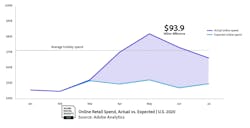The COVID-19 shutdown has pushed more companies to adapt to remote working and more schools to adapt to remote learning, a trend that FTR experts think will continue beyond the pandemic and put more stress on e-commerce and supply chains as the American consumer adapts to a more distant — but connected — world.
“We’ve accelerated the change that we would have experienced over the next 10, 20, 25 years,” according to Clay Slaughter, the chief strategy officer and general counsel for FTR Transportation Intelligence.
In July, e-commerce sales jumped 55% compared to July 2019, according to the Adobe Digitial Economic Index. That was down from the 76% year-over-year increase in June as more states reopened this summer. But even states that reopened by July still saw higher than average online spending, according to Adobe.
The first seven months of 2020 saw $434.5 billion in e-commerce spending, which is $93.9 billion ahead of January forecasts for the year. If the e-commerce growth continues, 2020 would exceed all online spending for 2019 by Oct. 5, according to Adobe.
As the COVID-19 pandemic has pushed more companies to embrace remote working, it could change how Americans choose where to live if they don’t need to commute to an office. Remote working, coupled with remote education, would make families more mobile, creating a “perfect storm” for e-commerce to flourish, Slaughter said.
The COVID e-commerce acceleration
“All of those things would have happened eventually,” Slaughter said during an FTR Engage virtual speaking session on the economic restart on Aug. 13. “But they would have happened slowly and disjointedly. They would have been regionally isolated and advancements would have been slow and choppy. What we see now is that everybody’s going to do it together. Everyone in the United States is having a conversation about how kids should go back to school. There’s no one immune to it: You are either saying we’re going to do it the way we’ve been doing it or we’re going to do it some totally new way.”
This tumultuous 2020 could be the start of a reimagining of American life. “Maybe we don’t want to work in our old office building,” FTR economist Bill Witte said. “Maybe we need to rethink how we’re going to do education. I think there’s going to be a lot of rethinking about that at every level.”
That rethinking could lead to a different American landscape, Slaughter said. “If I no longer have to live next to a school in order to get the education I want, I become a lot more mobile because I can give my children the education that I want them to have,” he explained. “That changes the personal real estate buying patterns in a way that we haven't experienced in the United States since the dawn of public education.”
This also ties into remote work, which has seen an even more drastic change during the pandemic. Slaughter called COVID-caused remote work a “forced experiment” that many businesses weren’t prepared for. “But they are now,” he said. “And they figured out that remote work is possible.”
And while there are benefits and drawbacks to remote work, more are seeing the benefits. “As an employer, do I need the commercial real estate footprint that I once had? Do I need everyone in one place? That’s a really expensive proposition,” Slaughter noted.
New possibilities
Businesses that find a way to work remotely will spend less on real estate while opening up other possibilities: “Do I need to be in the city center? Do I need to be next to other professionals that I want to interact with? Or can I be someplace else?” Slaughter asked. “Can we move our business operations for the folks that I want to be able to get together with to someplace that is cheaper to live? To someplace where it is easier to attract talent?”
If you don’t have to commute because you’re working from home, it makes you think about your home space, Slaughter noted. “If this is going to be my long-term gig, do I really want to work in my living room or my bedroom or my dining room forever? And that's going to have big fundamental shifts for housing, as the folks in the housing market are already talking about that and changes in buying patterns.”
Witte said these patterns are why he expects housing to rebound quicker from the COVID-19 recession. “I think that, in a lot of ways, residential housing comes back stronger,” he said. “Because, as Clay said, it’s going to be a shift towards bigger houses and probably more single-family houses for people.”
With more professionals leaving the dense urban centers for more spread out areas, possibly farther from traditional retail stores, it could accelerate another change in consumer patterns that would have a significant effect on the trucking industry: e-commerce.
Slaughter pointed to e-commerce as an example of rapid change that had been slowly building until the coronavirus was unleashed. “I think we’re seeing the birth of a new consumer,” he said, noting that it might have taken 20 years for e-commerce to become the staple of American life it has over the past six months.
About the Author
Josh Fisher
Editor-in-Chief
Editor-in-Chief Josh Fisher has been with FleetOwner since 2017. He covers everything from modern fleet management to operational efficiency, artificial intelligence, autonomous trucking, alternative fuels and powertrains, regulations, and emerging transportation technology. Based in Maryland, he writes the Lane Shift Ahead column about the changing North American transportation landscape.


